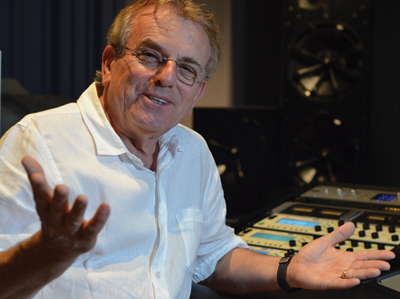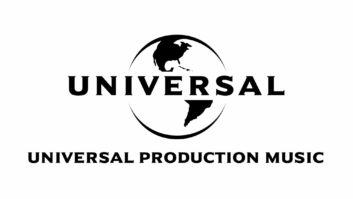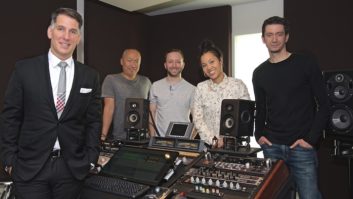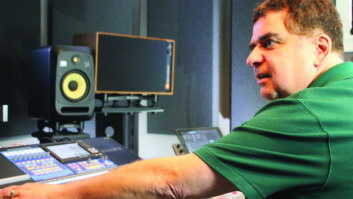
Vlado Meller is a mastering engineer. That’s all he does. That’s all he’s done since landing in New York City in 1969 and going to work at CBS Records in tape duplication and loading. While he did take violin lessons as a child, he never formed a band, never mixed live sound, never really tracked or mixed a record. He does mastering, and he’s still at the top of his game, one of a handful occupying the upper echelon of the craft worldwide.
But the mastering game has changed. Most sessions today are unattended, projects arrive in pieces, often from different engineers and producers, budgets are gone and label-run operations have been shutting since the mid-2000s. Top-level mastering engineers figured out awhile ago that they no longer had to be in a metro location to keep clients; they just needed to deliver the sound. Ludwig went to Portland, Sax moved out to Ojai, and now Meller, who has a longer tenure than them all, has moved to Charleston, South Carolina, setting up a home base within Bruce Freshley’s Wes Lachot-designed Truphonic Studios complex. He admits it was a huge move for a typical New Yorker, but it’s even further away from his childhood roots.
Meller was born in Czechoslovakia and took violin lessons, later trained in music school. He was an electrical engineering student in Prague in the Spring of 1968 when the revolution broke out. Returning to the city after a break, he realized that half of his friends had fled the country in advance of the looming Soviet crackdown. He looked around, then jumped on a train for home. He said goodbye to his parents and snuck across the border to Austria. He spent four months in a refugee camp of sorts, with no papers or visa. Four months later he landed in New York City. Two months after that he had a job at CBS Records. These stories don’t happen anymore.
Meller worked at CBS Records (then CBS Sony, then Sony BMG, then back to Sony; same company) from 1969-2007, actually starting to cut vinyl in 1971. When Sony Studios shut down operations on West 54th in 2007, he went to Universal Mastering, where he stayed until 2011, when they shuttered. A brief stint at Masterdisk followed, and now he is happy in Charleston, with Vlado Meller Mastering at Truphonic Studios. With recording, mixing and mastering again under one roof, he says that he feels recharged.

The Truphonic Studios live room, within the same complex. Meller says that he feels recharged by the interaction with new artists, tracking sessions and mix dates under the same roof. Photo: Courtesy of Wes Lachot Design
At this point Meller has hundreds and hundreds of records under his belt, from Celine Dion to Red Hot Chili Peppers to Julio Iglesias to Kanye. But let’s go back to New York City, where it all started.
So it’s 1969 and you land in New York, then get a job at CBS Records.
I was blessed. I started out loading tapes, but I worked for huge labels, with huge clientele. I would come in the morning and my supervisor would say that Michael Bolton is coming at 10:30. Or Celine Dion. This is how I met people over 40 years. The biggest producers, artists and engineers in the world. I was lucky to meet them, work with them and have dinners with them. I have friendships with these people. That’s impossible to do today. Even at Sterling or Masterdisk at the time, they had to go hustle for clients. I didn’t have to do a thing.
I would get everything from Jack White or Harry Connick Jr. to Metallica. From Red Hot Chili Peppers to Celine Dion, from System of a Down to Juilo Iglesias, from White Stripes to Susan Boyle, from Il Divo to Kanye. I do pretty much everything. I’m one of the few guys in this country who does that type of range because I worked at the big labels. Whatever they threw at me I mastered it. I had to go through A&R, to the artist, the producer. They showed up for sessions. I learned about the whole business. Again, I was blessed to have that opportunity.
But Sony closed in 2007, Universal shut down in 2011, and I tried at Masterdisk for a while, but it didn’t last very long. It seemed a logical thing to go out on my own.
And so you thought of Charleston…?
Like everything else in life, it was chance and accident and who you know. My daughter graduated from Columbia, S.C., University of South Carolina. On the weekends when my wife and I would visit, she would suggest we go to Charleston. I had heard of it, a charming place, historic city, so we took a ride one day. It was the shock of my life. A beautiful place, great restaurants, beautiful scenery. It looks like an old French or English town with cobblestone streets and horse carriages.
At the same time, my former boss at Universal, Paul West—who’s my partner now in the business—has a house down there, so when he heard I was visiting my daughter, he said, “You should check out this studio down there.” Me, being a typical New Yorker who worked all my life in the city, said, “Who would build a studio in Charleston?” I’m used to Hit Factory, Electric Lady, Sony, and all these amazing places.
Then when I came here and checked out the studio [designed by Wes Lachot], I couldn’t believe the place. It’s gorgeous. It’s like a mini Sony Studios. Beautiful woodwork, fabrics on the wall, polished concrete, acoustics. I was totally floored. We meet for dinner and drinks and he knew my story through Paul. He asked me why I was living in New York City and New Jersey. “Why put up with that life? Come down here. It’s an easier life, you can enjoy yourself. You can go to the beach or the studio. We have a beautiful facility here, I’ll give you two rooms. We have a tracking room, a control room, and we have space.”
I looked around—I don’t jump on a horse immediately. I had worked in huge studios my whole life, so I needed to think about it. I was working at Masterdisk at the time. So I talked to my wife. My daughter had already graduated college. My son is a senior at West Virginia and could end up anywhere. I thought to myself, “I own all the gear, more than probably anyone in the world. Why am I sitting here? I can take it all down there.”
So it’s all your gear. I imagine so after 40 years.
I have top-of-the-line gear, probably more than any mastering engineer in the world. That started at Sony. Sony made sure that whatever we had was up to date and top of the line. I have an analog digital console/monitoring system from Chris Muth. It has eight digital and eight analog inputs, with a flat plate and a silver knob. He only made a few of them back in 1995, and Sony bought a couple. It’s the best system there is. I use Weiss EQs and Weiss compressors. I’ve set up the monitoring for surround, so I use the Z-Sys 6-channel EQ and compressor. We also master a lot of surround from stereo, so I use the TC 6000.
But it’s all about the PMCs. The PMC speaker, to me, is the best you can have. It doesn’t matter if it’s low level, mid-level or high level, there is clarity. You hear every little nuance. Some producers come here and are shocked when they listen, because they couldn’t hear it in the mix.

Meller’s room is not huge, but it works hand in glove with his PMC monitors and Bryston 7B and 4B amplifiers. Photo: Courtesy of Wes Lachot Design
I got the PMCs at Sony about 12 or 13 years ago. The room I had at Sony was beautiful, and it was huge. It was two stories high, and it was wide. I looked like a little peanut in there. It was almost too big to be a mastering room. We tried a bunch of different speakers, and when they brought these PMCs in, I was blown away. I played some records, even vinyl from the ’70s, and I heard everything. I listened and thought to myself that is exactly what I did. I knew this was a correct speaker, and to this day I trust these speakers 100 percent. I have enough amplifiers to kill a horse, the Bryston 7B and 4B. When you bought PMC back then, you had to buy Bryston. They are a perfectly matched pair. I had the same system at Sony, at Universal, and I brought them to Charleston. I hear the same thing.
So you have your gear, what did you think of the rooms?
Bruce [Freshley, owner of Truphonic Studios] had two rooms for me, some production rooms. The rooms are wonderful acoustically. We did a few slight modifications with panels on the wall because I work in surround. My speakers are huge—they’re seven feet tall, left-center-right—and they are very close, so we had to make sure they worked in the space. I’ve found that the low end is even tighter in this room than I’ve ever had. It floored me when I heard the low end here. It’s absolutely perfect. Some people think this might be overkill, but I can tell you, if you play them at low level, they play like regular speakers with even response. At all levels. If the client comes in, they are free to turn it up as much as they want. I don’t tell them how loud to listen.
But more importantly, there is no place left that has recording and mastering together [Editor’s note: except maybe Capitol Studios and Abbey Road]. I love to be on my own, locked in my own room, doing what I do, not having to deal with clients day to day. But I miss the interaction. This whole business is about interaction. If you look at the studio business over the past 30 years, it’s all about the time people spend in studios.
You’ve been there since opening on March 1. What do you think?
I never missed a beat. Our major labels are always busy. It’s across the board…albums from Smokey Robinson to Slipknot, Matisyahu, SBTRKT and Susan Boyle, to remastering the Red Hot Chili Peppers for iTunes high definition. I did all those Chili Peppers albums originally. Then slowly but surely the regional bands found out I’m here because they are using the Truphonic Studios. They see my Gold records and ask me what I do, believe it or not. I show them what it sounds like, what they can expect. One after another they start asking for me. I’m very proud of that. These bands come to the sessions and sit with me. They are floored with what they get. I just finished a local band two days ago. There is a lot of music here for a small town. You have R&B, hip-hop, rock, you name it. I expect that in NYC, but I thought Charleston was a little place with old conservative Republicans sitting around on porches. But it’s not. I’m very happy here. Paul West is the financial guy and he’s in Los Angeles. Peter, my booking manager, is in New Jersey. If I get a call at night, I can be at the studio in 10 minutes. In New York, it would have been the next day.
You’ve also started a mastering workshop.
That actually started two years ago in New York. At my age and my experience, I don’t worry about clients. I worry about the new generation coming in. Young people come to me today and ask me about mastering, and I almost feel sorry for them. How do you prove yourself and show that you’re the guy to master the album? The client will ask what you’ve done, what you’ve mastered. If you don’t have a past, which in our case is a discography, you are nobody. You could be the greatest computer genius, the biggest technologist, if you don’t have 20 albums that charted, nobody will talk to you. So if they want to learn, I’m here to teach.
We do it two or three times a year. We have one coming up in January, then March and maybe June. Usually it is three or four people. I want to keep it small and be personal. I could take nine of them and take their money, but I want to teach. And most of them want to open their own mastering place when they go home. They realize this is a niche in the industry they can make money in and have a job. I have an international clientele. From Poland, Sweden, China, Colombia, Germany, France. I was totally floored. Then I got people from NYU. They spent a quarter-million dollars on school and then come to me at the end. I explain the whole process, how albums are done these days, with different producers, engineers and studios. I always stress that at the end of the day, it’s not the gear you use but the sound you achieve. You can have different EQs and compressors and workstations, as long as you can achieve the sound and the client likes it, you are the winner.





